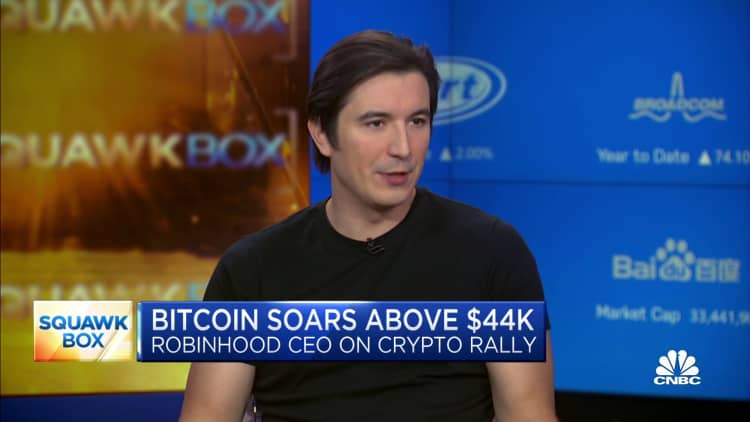

Robinhood logo displayed on a phone screen and representation of cryptocurrencies are seen in this illustration photo taken in Krakow, Poland on January 29, 2023. (Photo by Jakub Porzycki/NurPhoto via Getty Images)
Nurphoto | Nurphoto | Getty Images
Online brokerage giant Robinhood on Thursday said it’s launching a cryptocurrency trading feature in the European Union, pushing further outside the United States as the company looks to unlock growth from international markets.
Robinhood said its new crypto product would allow customers to buy, sell, and hold from a range of more than 25 tokens, including bitcoin, ether, ripple, cardano, solana, and polkadot. The company hopes to offer more tokens, as well as the ability to transfer and “stake,” or earn rewards from, crypto in 2024.
The move marks Robinhood’s second major expansion outside of the U.S., after it announced late last month that it plans to launch stock trades for U.K. customers by early 2024. The company opened a waitlist in the U.K. last week for the service, which will offer yields of up to 5% on customer deposits.
Robinhood is looking to tempt EU users into using its service with the ability to earn free bitcoin for users who trade lots and refer the app to their friends. The company will offer users up to one bitcoin, based on a a percentage of their monthly trading volume and the number of users they refer when they sign up.
It comes as several major U.S. crypto firms are turning to the European Union for growth after facing a tough time from regulators stateside. The U.S. Securities and Exchange Commission has targeted several crypto firms, including Coinbase and Binance, with lawsuits alleging they violated securities laws.
The EU, meanwhile, has proposed a comprehensive set of regulation, called the Markets in Crypto-Assets regulation, that would bring in stricter rules for crypto trading platforms and issuers of so-called stablecoins — tokens pegged to real-world assets like the U.S. dollar or euro.
Johann Kerbrat, general manager for Robinhood Crypto, said the firm chose the EU as the first international target market for its crypto product due to the region’s development of the world’s first comprehensive set of laws specifically tailored for the crypto industry.
“The EU has developed one of the world’s most comprehensive policies for crypto asset regulation, which is why we chose the region to anchor Robinhood Crypto’s international expansion plans,” Kerbrat said in a statement Thursday.
Robinhood also touted transparency and security features in its European crypto offering to convince users to trade with its service. The company said it would transparently display spreads on trades, including the rebate the firm receives from sell and trade orders.
Robinhood said it never commingles customer coins with business funds other than for operating purposes, such as payment of blockchain network fees, and stores all its customers’ coins in cold wallets disconnected from the internet.
Robinhood said it also has a crime insurance policy in place to ensure a portion of assets held across its storage systems are protected against losses from theft, including cybersecurity breaches. The policy is underwritten by underwriters at Lloyd’s, the insurance marketplace.
Theft of crypto has been a big problem for the industry over the past couple of years, with major hacks of blockchain networks resulting in millions’ worth of digital coins being drained from users’ wallets. Just last month, the HTX exchange and Heco bridge, two platforms linked to high-profile entrepreneur Justin Sun were hacked for an estimated $115 million.
The blurring of lines between trading venues and custodians became a big problem last year when FTX, the disgraced former $32 billion crypto exchange, collapsed after revelations that its sister market-making firm Alameda Research used customer funds to make risky bets on certain tokens.




